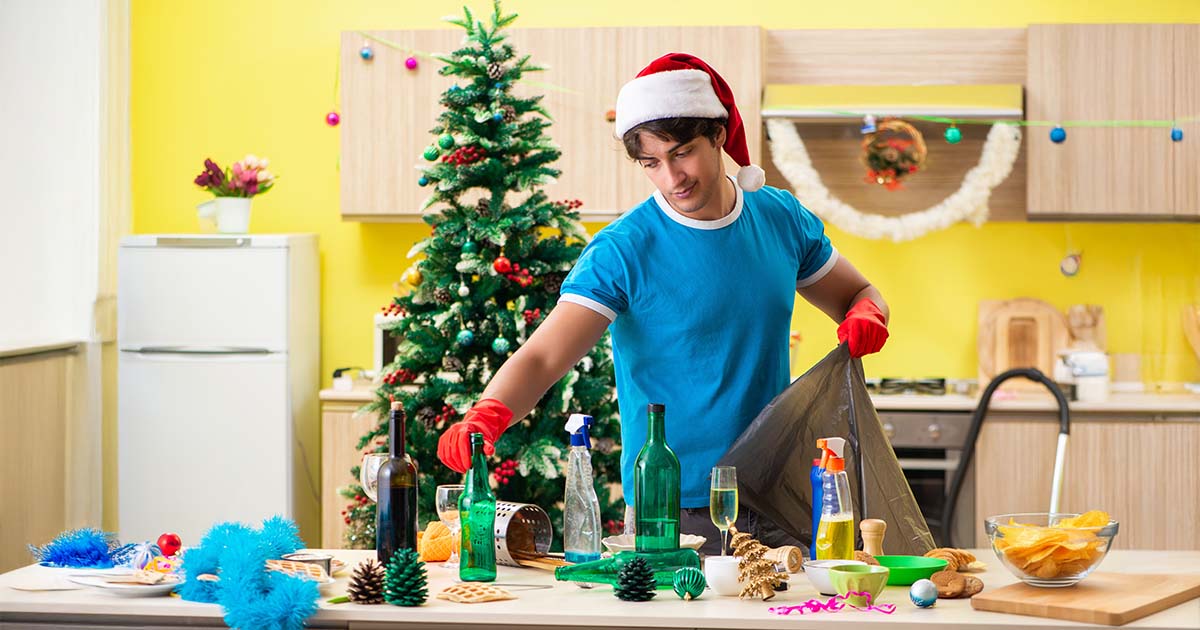Christmas Household Report 2025: Clean-Up & Unwanted Gifts Statistics

Table of Contents
1. Key Statistics
2. Who handles most of the Christmas cleaning
3. Christmas cleaning by age group
4. Cities with the biggest gender divide
5. Cities with the most equal split of cleaning
6. Whose gifts are most likely to be thrown away
7. Discarded gifts: Young Vs. Old
8. Gifts from work colleagues
9. Age groups least likely to discard gifts
10. City most likely to throw away Christmas gifts
11. How many gifts go unused or are thrown away
12. Christmas Waste Facts & Figures 2025
Christmas is the time when UK households come together for food, festivities, and generous giving. But behind the sparkle and celebration comes the familiar debate: who’s in charge of the clean-up? In this year’s Christmas Household Report, we take a closer look at who does most of the tidying up across the UK, which gifts are most likely to go to waste, and how much we’re really throwing away during the festive season.
From uneaten food and discarded decorations to those “funny” presents that end up in the bin, we’ve gathered the latest 2025 Christmas waste statistics to reveal the true picture of Christmas consumption. As the UK’s leading waste removal service, we believe it’s possible to enjoy the season without the excess, and this report highlights where small changes can make the biggest difference.
Christmas Clean-Up & Unwanted Gifts: Key Statistics
- 60% of UK adults say a woman does most of the Christmas Day cleaning, compared with 40% who say a man does. Women are almost twice as likely to take on the post-Christmas chores.
- Across all family members, female relatives (Mum, Sister, Auntie, Grandma, and Mother-in-law) are named as the main Christmas cleaner by around 17.2% of respondents, compared with around 10.1% who name a male relative (Dad, Brother, Uncle, Grandad, and Father-in-law).
- Almost half of those aged 55 and over (48.3%) say they personally handle most of the clean-up, making older Brits the most active tidiers after Christmas.
- In Edinburgh, the Christmas clean-up is the least balanced, with 79% of women taking the lead.
- Brighton, Leeds and Nottingham have the most even split, where men and women share the Christmas chores more equally.
- Only 1 in 6 Britons (16.9%) say the Christmas clean-up is shared equally, meaning most households still rely on one person to do the work.
Who does most of the Christmas clean-up?
Once the food is eaten and the presents are unwrapped, the real question begins: who actually does the cleaning up? To understand how this plays out across UK households, we surveyed a demographically representative sample of 2,000 UK adults in October 2025 through the market research company Censuswide.
Participants were asked: “Who, if anyone, does the most tidying up or clearing away rubbish on Christmas Day in your household (or the household where you spend Christmas)?
Analysis of our survey reveals that:
- 60% of UK adults say the Christmas Day clean-up is mostly done by a woman, compared with 40% who say a man takes the lead.
- 11.5% of respondents credit their partner, with almost two-thirds citing a female partner.
- Mum is named by 1 in 13 respondents (7.6%) as the main cleaner.
- By contrast, only 1 in 25 people (4.2%) say Dad does most of the cleaning.
- Across all family members, female relatives (Mum, Sister, Auntie, Grandma, and Mother-in-law) are named as the main Christmas cleaner by around 10% of respondents, compared with around 6% who name a male relative (Dad, Brother, Uncle, Grandad, and Father-in-law).
- 16.9% of Britons say everyone shares the tidying equally.
- Meanwhile, 4.5% admit that nobody tidies up at all on Christmas Day, leaving the mess for later.
Which age groups are most likely to do the Christmas clean-up?
Who actually takes charge when it’s time to tidy up? Our findings reveal that:
- Brits aged 16–24s are the least involved, with only 16.5% saying they do most of the cleaning themselves.
- Around a quarter (24.5%) of 25–34s say they take charge of the clean-up, often helping parents or partners rather than leading it.
- More than 1 in 3 (34.9%) of 35–44s handle most of the post-season clean-up.
- Almost half (44.1%) of 45–54s say they manage most of the cleaning.
- Those aged 55 and over are the most active, with 48.3% personally handling most of the clean-up – this was the highest of any age group.
Which UK cities show the biggest gender divide in Christmas cleaning?
To understand how gender roles differ across the country, we analysed responses at a city level. Only answers naming another person were included in this breakdown, as gender-specific data for “Myself” responses were only available nationally and could not be reliably attributed to individual cities.
- Edinburgh has the widest gender gap, with 79% of the Christmas clean-up done by women and 21% by men, making it the most traditional city in the UK during Christmas.
- Belfast ranks second, where women are nearly twice as likely as men to handle the tidying.
- Meanwhile, Leeds, Nottingham and Brighton are the most balanced cities, with an even split between men and women doing post-Christmas chores.
| Rank | City | % Female Does Most | % Male Does Most | Gender Gap (Female - Male) |
|---|---|---|---|---|
| 1. | Edinburgh | 79.07% | 20.93% | +58.14 |
| 2. | Belfast | 73.68% | 26.32% | +47.36 |
| 3. | Southampton | 67.31% | 32.69% | +34.62 |
| 4. | Cardiff | 65.96% | 34.04% | +31.92 |
| 5. | Norwich | 65.91% | 34.09% | +31.82 |
| 6. | London | 63.79% | 36.21% | +27.58 |
| 7. | Newcastle | 62.96% | 37.04% | +25.92 |
| 8. | Glasgow | 62.50% | 37.50% | +25.00 |
| 9. | Manchester | 60.00% | 40.00% | +20.00 |
| 10. | Liverpool | 59.57% | 40.43% | +19.14 |
| 11. | Bristol | 55.36% | 44.64% | +10.72 |
| 12. | Birmingham | 54.13% | 45.87% | +8.26 |
| 13. | Leeds | 50.00% | 50.00% | 0.00 |
| 14. | Nottingham | 50.00% | 50.00% | 0.00 |
| 15. | Brighton | 50.00% | 50.00% | 0.00 |
| 16. | Sheffield | 48.72% | 51.28% | −2.56 |
| 17. | Plymouth | 35.48% | 64.52% | −29.04 |
Where in the UK is the Christmas clean-up most equally shared?
Among those who share Christmas chores, our city-level findings reveal that:
- Brighton leads the country in sharing the Christmas clean-up, with nearly 1 in 4 households (23.5%) saying everyone helps tidy up on the day.
- Sheffield and Birmingham follow, with around 1 in 5 households (20–23%) reporting an equal split in post-Christmas chores.
- Southampton and London are the least likely to share chores, with fewer than 1 in 7 households (around 9% and 13% respectively) reporting an even split.
- Nationally, only 16% of Britons say the Christmas clean-up is truly shared, showing that most households still rely on one person to do the work.
| Rank | City | % Saying “Everyone Shares the Christmas Tidying Equally” |
|---|---|---|
| 1. | Brighton | 23.53% |
| 2. | Sheffield | 21.43% |
| 3. | Birmingham | 20.00% |
| 4. | Manchester | 17.39% |
| 5. | Leeds | 17.00% |
| 6. | Bristol | 16.67% |
| 7. | Glasgow | 16.50% |
| 8. | Cardiff | 12.50% |
| 9. | London | 13.04% |
| 10. | Southampton | 8.82% |
Whose Christmas gifts are most likely to be thrown away?

Now that we know how Christmas chores are distributed, we also surveyed 2,000 Brits with the following question: "Whose Christmas gift(s) that were given to you are you most likely to throw away after Christmas, if anyone's?".
Our findings revealed that:
- 1 in 6 Britons (16.6%) are most likely to throw away gifts from their work colleagues – the most common source of unwanted presents.
- 10.8% of Brits don’t receive any Christmas gifts at all.
- Around 1 in 10 Brits (9.5%) are most likely to throw away gifts from their neighbours after Christmas.
- Around 1 in 4 women (26.4%) say they would throw away gifts from work colleagues.
- Around 1 in 5 Scots are most likely to discard gifts from their work colleagues.
- 1 in 10 people in Northern Ireland throw away gifts from their neighbours.
Here’s what our data shows when we isolate partner-related responses:
There were also some very noticeable trends in people throwing away gifts their partner has given them. Here’s what our data shows when we isolate partner-related responses:
- Women are nearly twice as likely to throw away gifts from their partner, with 4.4% of women and 2.4% of men saying they are likely to do so.
- 18% of residents from Northern Ireland throw away gifts from their partners.
When asked whose Christmas gifts they would be most likely to throw away after the holidays, nearly 1 in 5 Britons (18.3%) selected the ‘Other’ option.
- Of these, around 95% gave responses such as “None,” “Nobody,” “No one,” or “Wouldn’t throw away” – indicating they wouldn’t discard any gifts.
- The remaining 5% mentioned specific cases, including Secret Santa, strangers, sisters-in-law and someone cryptically saying they received a gift from a person ‘pretending to be family’.
| Rank | Gift Source | % of Brits who would most likely throw away their present(s) |
|---|---|---|
| 1. | Work Colleague | 16.55% |
| 2. | Neighbour | 9.55% |
| 3. | In-Laws | 6.45% |
| 4. | Friend | 6.45% |
| 5. | Family Friend/ Godparent | 5.30% |
| 6. | Partner | 4.80% |
| 7. | Child/Children | 4.75% |
| 8. | Parent(s) | 4.25% |
| 9. | Auntie/Uncle | 3.50% |
| 10. | Sibling | 2.35% |
Table of the top 10 people Britons would most likely throw gifts away from – excluding the ‘Other’ option, ‘N/A I don’t receive Christmas gift(s)’, and ‘N/A I don’t celebrate Christmas’.
- Work colleagues ranked highest as the people whose gifts were most likely to be thrown away, with 16.55% of Britons selecting this option. This was followed by neighbours, with 9.55% saying they would be likely to throw their gifts away.
- Less than 2% of Britons said they would throw away gifts from their cousins, making them the least likely group to have their presents discarded.
How often are young Brits more likely to throw away gifts compared to older generations?
- Those aged 25–34 are the most likely overall to throw away gifts from work colleagues (17.99%) and family friends or godparents (10.03%) — both the highest figures across all age groups.
- This age group is also around three times more likely than those aged 55+ to discard gifts from a child or children.
- 18–24s are about three times more likely than over-55s to throw away gifts from their parents, and over five times more likely to discard gifts from their aunties or uncles.
- 35–44s are around three times more likely than those aged 55+ to throw away gifts from their partners
This analysis excludes ‘N/A’ and ‘Other’ responses, focusing only on specific gift sources to compare age groups more clearly.
Which age group throws away gifts from their work colleagues most often?
Across all age groups, work colleagues ranked highest as the people whose gifts were most likely to be thrown away. But which age group does this the most often? Our findings reveal that:
- Among 18–24s, 16.98% throw away gifts from their work colleagues.
- Those aged 25–34 are most likely to discard gifts from their colleagues, with 17.99% doing so.
- 17.88% of those aged 35–44 throw away gifts from their work colleagues, followed closely by 17.46% of those aged 45–54.
- The least likely age group to throw away gifts from their colleagues is those aged 55 and over (14.93%).
Which age group are the least likely to throw away gifts?
- Those aged 55 and over are the least likely to throw away gifts, with fewer than 1 in 10 (8%) doing so.
- They are also the most likely of any age group to receive no Christmas gifts, with 1 in 6 (16.29%) saying they don’t receive any.
- This means those over 55 are nearly five times more likely than 18–24s to receive no Christmas gifts.
- For context, among those aged 18–24, only 3.3% reported not receiving gifts.
Which city is most likely to throw away Christmas gifts?
- By gift type, Glasgow leads for discarding presents from work colleagues (22%).
- Belfast tops for discarding gifts from partners (nearly 18%).
- Leeds ranks highest for discarding gifts from in-laws (just over 13%).
- Bristol leads in discarding gifts from neighbours (12%).
How many Christmas gifts do Brits throw away or leave unused each year?
Every Christmas, millions of gifts are exchanged — but not all are kept or appreciated. Here’s what third-party data reveals about Christmas gifting habits in the UK:
- Each year, the UK throws away approximately £42 million of unwanted presents, most of which end up in landfill. (Defra, 2024)
- Brits spent an average of £186.29 on Christmas presents in 2024 (TGI), yet Depop research shows at least one unwanted gift worth £34 is discarded per person each year, adding up to £1.2 billion in wasted presents.
- Clothing tops the list of most gifted items (27.5%, TGI), yet 1 in 4 Brits aged 25–35 admit they discard clothing and accessories after Christmas.
- A little over half of Brits (58%) say they’ve received an unwanted Christmas gift. (Finder, 2024)
- In a 2023 Ipsos survey, almost half of parents (46%) said they were worried their children would be disappointed by their Christmas gifts.
- Meanwhile, a third of Brits (32.8%) said they would consider buying second-hand gifts.
Christmas Waste Facts & Figures 2025
Using the latest third-party data, here’s what the UK’s Christmas waste really looks like:
How often do single-use Christmas items go to waste?
Crackers, tinsel and Advent calendars are staples of the festive season — but most only last for one Christmas before being binned. The latest Christmas statistics show that:
- 1 in 3 Brits (33%) buy an advent calendar for themselves each year, with chocolate calendars making up 75% of the total advent calendar sales. (YouGov report, 2024)
- An estimated three million Christmas crackers are pulled every festive season, making them one of the UK’s most purchased — and most disposable — Christmas items. (Peak statistics, 2025)
- Many of these items are single-use plastics or mixed-material products that can’t be easily recycled, meaning they’re often sent straight to landfill after Christmas.
How much waste comes from Christmas decorations and trees each year?
- Around eight million Christmas trees are bought in the UK annually, generating 12,000 tonnes of green waste once the festivities are over (NLWA, 2024).
- More than half of UK adults (55.5%) now use an artificial Christmas tree, with many citing sustainability as the main reason (TGI, 2025).
- The UK disposes of 500 tonnes of Christmas lights every year — equivalent to around 70,000 miles of tangled cables (Waste Mission, 2024).
- In addition, 189 million batteries are used and discarded across the UK over the festive season.
How much do Brits spend on Christmas dinner & and how much goes to waste?
- Over two-thirds of Brits (68%) buy food specifically for Christmas, with most planning to spend between £100 and £149 on Christmas groceries (TGI, 2025).
- Every year, the UK buys over 10 million turkeys for Christmas — but an estimated 2 million of them are discarded after Christmas Day (Cornish Food Box Company, 2024).
- 7 in 10 people admit to buying more food than they need for Christmas. Around 230,000 tonnes of festive food is thrown away each year — the equivalent of 42 million plates of wasted meals (Waste Mission, 2024).
- According to a recent Too Good To Go survey, Yorkshire puddings, condiments, gravy and crisps are the most commonly binned Christmas foods, while meat, potatoes and cheese are most likely to be reused.
- The most popular supermarkets for Christmas groceries are Tesco, favoured by 26% of Brits, followed by Sainsbury’s (22%) and Aldi (20%) (TGI, 2025).
Research methodology
To determine the gender split, all responses were weighted nationally. Answers of “Myself” were assigned to the respondent’s own gender, while “Partner” responses were counted as the opposite gender (male respondents → female partner; female respondents → male partner).
Gender-specific relatives (such as Mum, Dad, Sister, Brother, Auntie, Uncle, Grandma, and Grandad) were recorded according to their stated gender, while gender-neutral responses (like Child, Cleaner, Friend, N/A or Other) were excluded.
Keep Your Christmas Clean-Up on Santa’s Nice List with HIPPO
It’s the most wonderful (and messiest) time of the year — but HIPPO’s here to help you keep the Christmas clutter under control.
From collecting the DIY home renovation waste you created before inviting the family round for Christmas, to disposing of old items that were replaced during Boxing Day and New Year's sales, our HIPPOBAGs make it easy to keep your home clutter-free throughout Christmas.
When the festivities are over, HIPPO is here to take the hassle out of your clean-up. Just book your collection online or get in touch with our friendly team!

